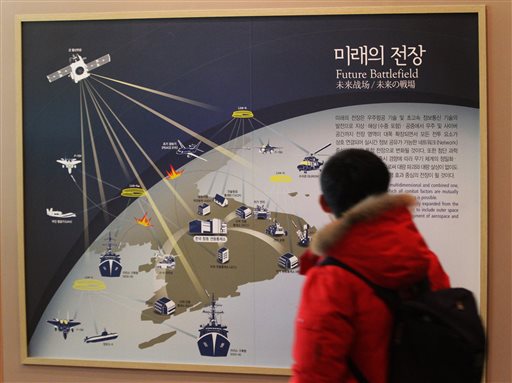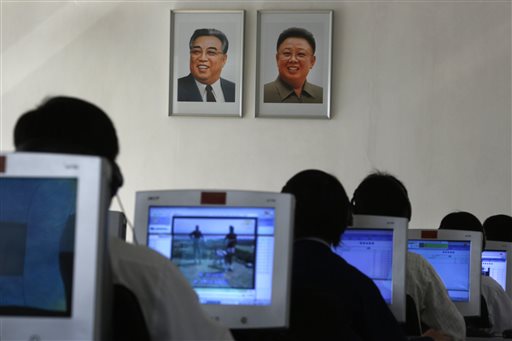A look at North Korea’s limited Internet capabilities

A South Korean student looks at a picture, which shows how the cyber warfare is going to be waged in the future in the Korean Peninsula if Korean AP PHOTO
SEOUL, South Korea – An hours-long Internet outage Tuesday in one of the world’s least-wired countries was probably more inconvenient to foreigners than to North Korean residents, most of whom have never gone online. Even for wired Koreans south of the heavily armed border separating the rivals, the temporary outage made little difference — southerners are banned by law from accessing North Korean websites.
While North Korea tightly controls its citizens’ activities, especially their access to information on the outside world, it does have a cyberspace. Here’s a look at North Korea’s unique broadband and mobile Internet, the country’s use of email and its tightly controlled use of a domestic Intranet.
Internet vs Intranet
Only a very small number of people among North Korea’s elite use the Internet, as the rest of the world knows it. A slightly larger group of privileged North Koreans can see a tightly controlled Intranet called “Kwangmyong,” meaning “Bright.”
On this self-contained, authoritarian alternative to the World Wide Web, chats and emails are monitored and content comes pre-filtered by the state.
The Intranet provides a connection between industry, universities and government. Its role seems to be to spread information, rather than for commerce, entertainment or communication, Will Scott, a computer science instructor at Pyongyang University of Science and Technology, told the AP in February.
It is unclear how many Internet-connected devices are used in North Korea. But it’s likely that the number of Internet users is small considering that the country has only 1,024 Internet Protocol addresses for a population of 25 million, according to So Young Seo, a researcher at South Korea’s state-run Korea Information Society Development Institute.
North Korea’s small circle of Internet users consist of elites in the government and military, propagandists and media workers, state-trained hackers and researchers at education institutes such as Kim Il Sung University and the Pyongyang University of Science and Technology, Seo said.
Other North Koreans are limited to the intranet, which provides access to state media and a limited number of information sources that were pulled and censored from the real Internet.
Most common North Koreans probably don’t actively use Kwangmyong because owning a computer requires permission from government authorities and would cost as much as three months’ salary for the average worker, Seo said.

FILE – In this Thursday, Sept. 20, 2012 file photo, North Korean students use computers in a classroom with portraits of the country’s later leaders Kim Il Sung, left, and his son Kim Jong Il hanging on the wall at the Kim Chaek University of Technology in Pyongyang, North Korea. AP PHOTO
It’s unclear what was behind the temporary shutdown of key North Korean websites. The shutdown followed a US vow to respond to a crippling cyberattack on Sony Pictures that Washington blames on Pyongyang. The White House and the State Department declined to say whether the US government was responsible.
A cyberattack on North Korea would be an exercise in futility if the purpose was to cause a serious disruption, said Chang Yong Seok, a North Korea expert at Seoul National University.
“Even if their Internet is shut down, the inconvenience will be shared only by members of the power elite,” Chang said. “It would be an entirely different matter if hackers manage to penetrate the Kwangmyong network, but that has never happened before.”
Mobile phones
Cell phone use in North Korea is also controlled by the government. While mobile phones are now a popular gateway to the Internet in the South, for North Koreans cell phones are used for domestic calls. They can’t access the Internet or make overseas calls.
Cellular service is provided by Koryolink, a joint venture between North Korea’s Korea Post & Telecommunications Corporation and Egypt’s Orascom Telecom Media and Technology Holding SAE.
More than 2 million cellphones are used in North Korea, according to the International Telecommunication Union. But the number of mobile users is believed to be significantly smaller, Seo said, because elite North Koreans often use more than one device because it’s cheaper to buy a new phone than buy additional minutes on the same handset.
In 2013, North Korea began to allow foreigners to access the Internet through the 3G networks. They could upload posts or photos on Twitter and Instagram from North Korea. Starting last year, North Korea began selling monthly mobile Internet data plans to foreigners for use with a USB modem or on mobile devices using their SIM cards.
Orascom built a 3G network more than five years ago. The network now covers most major cities.
Propaganda use and past attacks
North Korea’s use of the Internet targets outsiders more than residents, who still mostly rely on traditional outlets for information and entertainment.
Various North Korean government bodies have launched websites as well as English-language Facebook pages, YouTube channels and Twitter accounts to spread propaganda aimed at international audiences. The North uses social media to praise its system and leaders, and to repeat commentaries sent out by the country’s official Korean Central News Agency.
In 2013, some of these social media accounts run by North Korea were hacked by those who purported to be part of the hacker activist group Anonymous. Hackers left a message on Twitter and posted a picture of the North Korean leader’s face with a pig-like snout and a drawing of Mickey Mouse on his chest.
In another attack, Pyongyang saw intermittent Internet access for two days in March 2013. North Korea blamed the shutdown on the United States and South Korea, accusing the allies of “intensive and persistent virus attacks.”
South Korea denied the allegation and the US military declined to comment.
RELATED STORIES